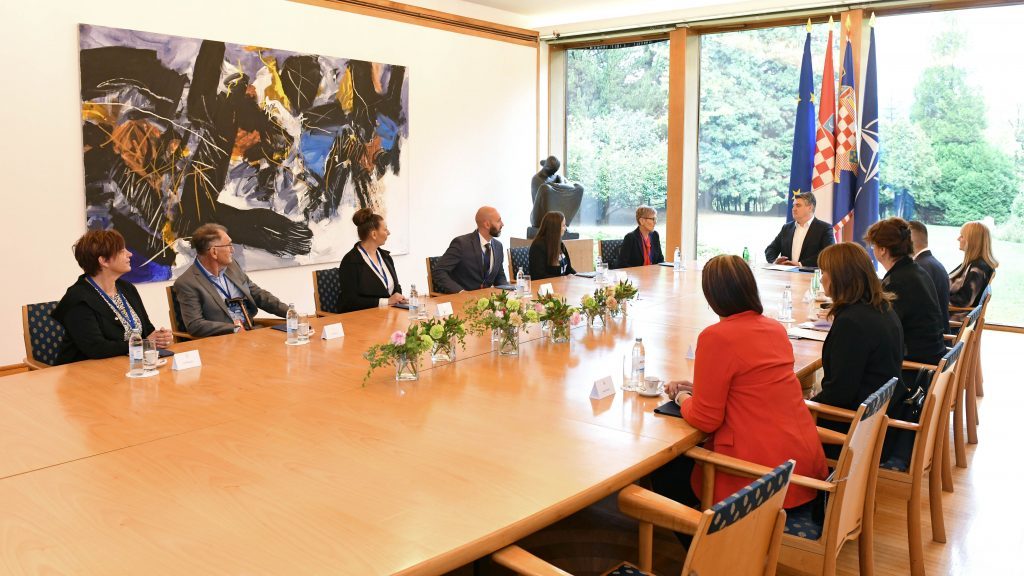
Krapina-Zagorje Regional MS Society of the Croatian National MS Society Celebrates 20 Years Anniversary
30.11.2022Guest Blog Post by Nataša Hlaban, EMSP Board Member and Project Coordinator at the Regional MS Society in Krapina-Zagorje County, a branch of the Croatian National MS Society.
“After more than two years of an unusual way of life due to the pandemic, the Multiple Sclerosis Society from the Croatian region of Krapina-Zagorje was finally able to carry out all activities normally, but also to mark an extremely important moment – 20 years of their existence. A big meeting of their members, donors, guests, experts, and citizens was held on 26th September 2022. In addition to celebrating two decades of the association’s existence, the event was an opportunity for their members and guests to learn more about the treatment and monitoring of disease, first-hand – from experts, about their rights, innovations in public policies related to health, social issues, as well as the protection of the rights of MS patients and people with disabilities.
As it was emphasized during the program, people with multiple sclerosis face many issues at all stages of the disease. During the lecture for the members and patients, as well as other medical and similar professionals that attended this event, the significance of the diagnosis for the future course of the disease and its treatment was one of the most important focuses. People with multiple sclerosis agreed that they want to receive accurate, new, and important information so that they can make informed decisions about all the issues they need when it comes to treatment, as well as their plans for personal lives. The importance of professional support as the only way to receive information on all issues that are important to them was pointed out. They were informed about the stages of the disease, available forms of treatment, and information on how progression can be monitored by clinical trials. It was especially highlighted that early treatment slows the progression of the disease and reduces the risk or delays the onset of permanent disability. In addition to the latest and accurate information on the detection and treatment of multiple sclerosis, participants were informed about patients’ rights.

In addition to this program, it is important to highlight that the President of the Republic of Croatia, Zoran Milanović, held a meeting with the representatives of the Multiple Sclerosis Society of Krapina-Zagorje County on the occasion of celebrating their anniversary, as well as on the occasion of the Croatian National Multiple Sclerosis Day held on September 26. The representatives informed President Milanović of their activities aimed at improving treatment, research, rehabilitation, and protection of people living with multiple sclerosis and related diseases, as well as all people with disabilities. It is important to highlight that this regional MS Society has the highest number of members in relation to the number of inhabitants, compared to all other counties in Croatia.
Speaking about their activities, they stated that they actively contribute to concrete changes in their community, implementing programs and projects, and co-creating strategic documents and action plans in the sphere of social policy and people with disabilities at the regional level. In this regard, they emphasized the implementation of projects providing personal assistance for people with disabilities, programs that enable the support of psychologists and physiotherapists, support for the empowerment and employment of marginalized groups, and the provision of support for teaching assistants to students in primary and secondary schools.
Along with the important anniversary celebration, the MS Society published a monograph in which they reflected on their work, cooperation with various stakeholders, and the successes they achieved in order to fulfill their vision and mission. There were many stories told, since the MS Society implements ten to fifteen projects and programs per year, and the main goal of all of them is to provide the necessary support to vulnerable groups – primarily people with MS and disabilities, students with difficulties, and – indirectly – also their family members. As a rule, programs and projects include the development of supplementary and alternative services to the regular service provided by state or public institutions. Thus, they provide support to target groups in the community in which they live, with the goal of their greater independence.
During the gathering, it was highlighted that the MS Society as it exists today was created by members and supporters altogether. They were always united because they were and they remained true to themselves, to a vulnerable person, a person who wants to live his life as best as possible. Everything that was difficult should be forgotten because it had to happen for a reason. A growing MS Society happened, an MS Society that showed all the power of courage and perseverance.”
 Your Account
Your Account


